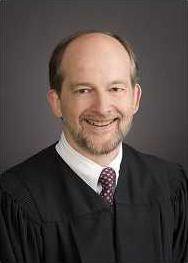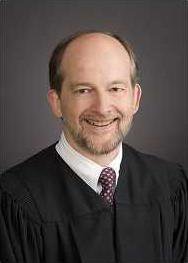Justices from the Kansas Court of Appeals brought their work to Great Bend Tuesday. At Barton Community College and the courthouse, justices heard arguments on cases dealing with child custody, a driving under the influence arrest, and the post-release supervision of a man convicted of a sexual offense.
The hearings were held here as part of the county’s Constitution Day observance. Although none of the cases originated in Barton County, several people attended as a three-judge panel listened to oral arguments.
Presiding Judge Steve Leben of Fairway shared a personal connection to Great Bend during the introductions.
"When I was 2 I lived in Great Bend," he said, adding he visited the hospital here twice during that time.
Leben commented on the significance of Tuesday’s hearings, which drew BCC students from criminal justice, history, psychology and political science classes, as well as interested individuals from the community.
"Many people have a real experience with the court," he said. In a 10-year period, 50 percent of the population will have that experience. Some will be charged with crimes, some will be involved in civil cases or domestic cases, and some will be asked to serve on juries.
For Tuesday’s proceedings, he was joined by judges G. Joseph Pierron Jr. from Lawrence and G. Gordon Atcheson of Overland Park. Attorneys for each side had about 15 minutes to present argument to the judges, who sometimes asked questions. They will take each of the cases under consideration and will issue a written decision in about 60 days, Leben said.
After hearing the arguments, the justices answered questions from the public.
"Obviously, we can’t talk specifically about this case or others that are on our docket," Leben said.
One question from the audience dealt with whether a custody issue that was settled one way — such as the one from Clark County presented Tuesday at the college — could be overturned on appeal because of a "technicality."
"Most of the time the things we refer to as technicalities are your constitutional rights," Leben said. In fact, the cases heard Tuesday were chosen for the interesting constitutional issues they raise. "The constitutional rights we all share are tested daily in cases like these."
A true technicality should not matter, he said. "We see if rights are preserved."
"We look at legal errors," Atcheson added.
"It’s not for us to decide how we would decide the case if we were the trial judge," Leben said. "The majority of our decisions are based on precedents of other cases."
Pierron said the rulings that create precedents — used as a standard in subsequent similar cases — come from higher courts, and the lower courts must follow the precedents set by them, although higher courts do sometimes reverse their own decisions.
"I had one case that went to the U.S. Supreme Court and it was reversed," Pierron said. "I was happy. We don’t make the law, we follow it. I had followed a precedent I thought was wrong."
A BCC political science student in the audience wanted to know how he could someday have Leben’s job, or one like it. "How did you get from being an attorney to being a judge?"
The justices arrived at their appointments in different ways. Pierron was once a county attorney; Atcheson worked for a law firm. Leben said a judge is expected to uphold constitutional rights and be fair and balanced. Some judges are elected and others are appointed. Those in the higher courts get there with a bit of luck, or at least by being at the right place at the right time, since their numbers are so few. Kansas has seven Supreme Court justices and 13 court of appeals justices.
Congress has directed by law that federally funded educational institutions such as BCC host educational events about the U.S. Constitution on or about Sept. 17 each year. The Constitution was signed by a majority of the delegates to the Constitutional Convention on Sept. 17, 1787. Past events have included mock trials.





